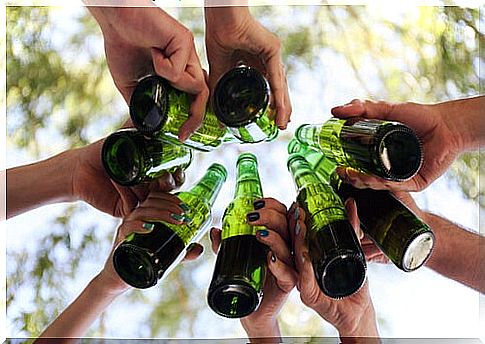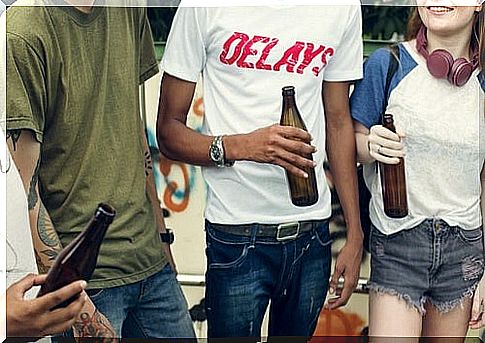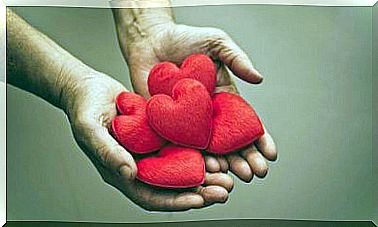Why Do Teens Use Alcohol As A Social Facilitator?

Alcohol is one of the most consumed psychoactive substances. Being its legal consumption and having multiple effects when it is abused, it has become a problem both at a social and health level.
Although in adults it can have important consequences, in the case of adolescents the situation is usually more worrying. This is due to the number of factors that can affect its consumption, to the point of becoming a social facilitator.
Therefore, it is important to understand why adolescents use alcohol as a social facilitator or as part of developing their autonomy. Likewise, some factors that can help prevent consumption at this stage of development should be made known.

Why are teens vulnerable to alcohol use?
The availability and consumption of alcoholic beverages increases in society due to multiple factors. Among them is the physical presence, the ease of people to acquire them at any time and the uncritical attitude of society for their excessive consumption. In the same way, the relationship that exists between their consumption with recreational, festive and daily activities will be important .
Likewise, the inherent conditions of age appear as factors that predispose them to be consumers of this harmful substance.
This is also affected by the socio-psychological situations that people go through at this age. In this case, some of the aspects that may be influencing consumption are:
- The characteristic hedonism of this age.
- Search for their own identity in a personal way or from the group factors that are developed.
- Exploration of new sensations.
- Group integration.
In the same way, there is a positive perspective towards this substance, since it is for them a social facilitator. Consequently, it allows them to improve social relationships and, therefore, several of these needs are met, which, for their age, are paramount. Even so, it is important to indicate that the type of consumption is episodic and explosive.
Also, it is especially related to night and group activities, which take place with special frequency on weekends. In addition, at this time, consumption is excessive. Therefore, it can be “your strategy” to function in the social field and feel part of a group.
Personal aspects of adolescents that alcohol makes a social facilitator
To begin, it is important to note that teens have “positive” beliefs about alcohol. Referring especially to changes in mood, behaviors and emotions.
Therefore, they find rewarding consequences in consumption, such as feeling euphoria and relaxation, loss of notion of time or disinhibition.
A good part knows the negative consequences of consumption. That is, they are aware that alcohol consumption is a risk factor for certain negative events to occur.
Here, the sense of invulnerability felt by many adolescents takes center stage. In other words, they know there is a risk, but in their head the estimate of the probability of that happening to them is very low.
In other words, they take a position where, for them, they cannot be affected by substance use. An example of this is the rejection of the feeling of hangover, which is especially diminished in adolescents. As a result, the physical sensation of discomfort is usually markedly diminished in this population.
Self-esteem and self-reference is another relevant aspect of alcohol consumption in adolescents. Concepts such as: reputation, feeling part of a group, projecting a good image on others are usually related to this aspect.
In the case of alcohol, it has been found that its consumption can be a way to improve the image that they project to others. Likewise, the adolescent can test his physical and psychological capacities regarding this substance.
How does the family contribute to alcohol consumption in adolescents?
The parents play a key role in the process of adolescent development. Therefore, they can help them to have strategies other than alcohol consumption to develop social aspects and self-esteem.
They must take into account the modalities of communication with them. Likewise, the correct presentation of the risks and consequences of the consumption of these substances takes center stage.
Learning communication strategies between parents and children is essential to avoid turning alcohol into a social facilitator. Therefore, it is good to favor:
- Open and assertive communication.
- Support in the decisions and opinions of the children.
- Have expressions of affection in the family.
- Understand the different attitudes and personality traits.
By keeping these points in mind, teens are more likely to feel valued, accepted, and confident about themselves and their family.
As a consequence, children will turn to parents for guidance and help in social development with their peers. Serving as a guide for different social situations and helping to develop healthy socialization strategies. The consequence is that they will stop seeing alcohol as a good social facilitator.

Strategies to avoid alcohol consumption in adolescents
There are different strategies that can be implemented for teens to stay away from alcoholic beverages.
One of them is to stimulate the learning of positive values from childhood. In this case, many adolescents, like adults, tend to maintain a coherence between the values that they defend with their actions and those that they defend with their words.
A detachment from dissonance that favors self-control. An element that allows adolescents to satisfy their need for autonomy and their desire to experiment. Therefore, this type of learning will not only help their behavior to be better in any type of situation, but it will also keep them away from alcohol consumption.
Another strategy that can be used is to run a school for parents. In it, professionals from psychology, education and social sciences provide different tools so that they know how to position themselves in the face of the challenges that adolescents may pose.
The objective of this activity is for parents to be able to stimulate:
- Values.
- Social skills.
- Appropriate behaviors.
- Coping with difficulties.
- Esteem.
- Psychological balance in your children.
All this is given in order that they themselves are the ones who take care of their health, prioritizing the benefits over it to others derived from alcohol consumption, such as the increase of cohesion in the group.
They can also get the message across. Alcohol is not the best social facilitator, as there are more powerful and less risky strategies.









